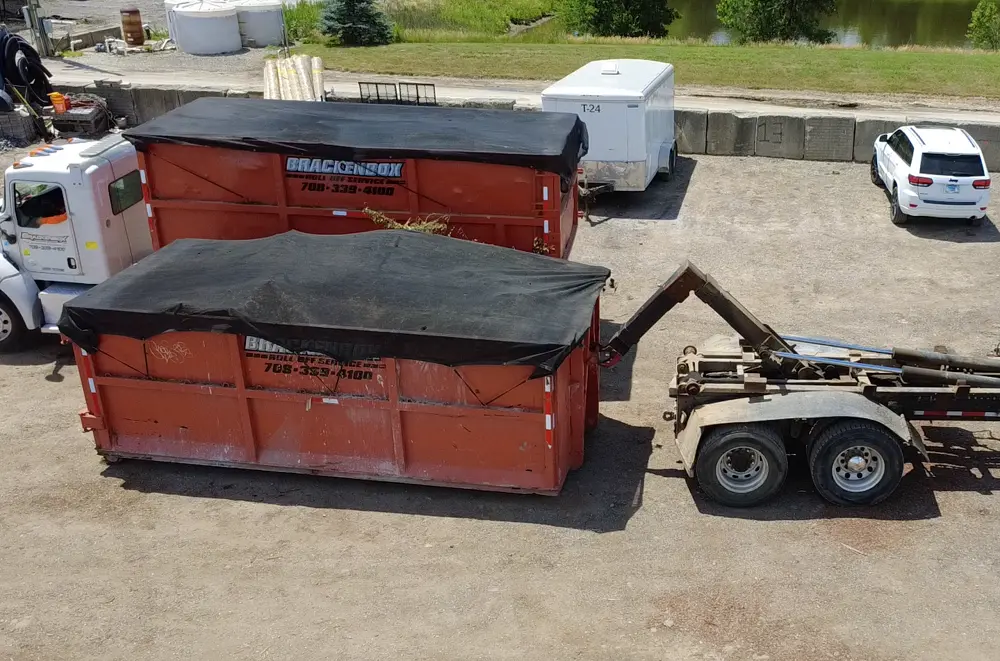Common Rules When Placing a Dumpster on the Street
Navigating the maze of regulations surrounding dumpster rental in the city of Chicago, especially when considering placement on the streets, can be daunting. Chicago, much like other metropolises, has specific instructions on where to put a dumpster, duration permits of how long can a dumpster be on the street, or how long can you have a dumpster in your driveway curated for both businesses and residential zones. These guidelines are usually available at city hall or the local government office and are established to ensure safety, maintain aesthetics, and uphold functionality throughout the city.
Businesses Dumpster Placement Requirements
In Chicago, especially within its bustling central business district, businesses must adhere to stringent dumpster placement rules. Beyond the universal requirement of obtaining the correct dumpster permits, businesses must ensure dumpsters remain inconspicuous, not obstructing public views, signage, or architectural facades. Given the dense nature of urban settings, businesses also must be mindful of the space limitations of a Chicago dumpster. When the dumpster arrives, crowded alleyways and parking areas require a strategic placement to avoid inconveniences. Plus, regulations often stipulate that containers maintain a specific distance from adjacent buildings. This ensures no overflow onto neighboring properties or city property.
Chicago Residential Dumpster Placement Requirements
For the city's residents, the placement of a dumpster in front of a home or on any residential street has its own set of challenges. The size and weight of the dumpster, as well as its intended location, play significant roles in determining its placement. You'll want to ensure that a dumpster in front of my house doesn't impact public rights-of-way, easements, or obstruct pedestrian pathways, always keeping in mind accessibility for all, including those in wheelchairs. But aesthetics matter, too. Municipal regulations often dictate how close can a dumpster be to residence entrances, exits, and even side property lines, all aiming to retain the city’s visual appeal and minimize risks associated with waste spillage.
Where Not to Position Your Roll-Off Dumpsters
Here's an overview of areas to avoid when placing your roll-off container:
Sloped Surfaces
Setting your roll-off dumpster on a sloped driveway, and other inclined terrains has significant risks. Due to the dumpster's weight and shifting waste, it could slide or even topple, resulting in potential hazards.
Other Private Property
It's essential to avoid putting a rented dumpster on another person's property without getting their explicit consent. Doing so isn't just inconsiderate but can also expose you to legal disputes.
City Streets
A city street or another public right of way often has specific regulations about dumpster placements. Before positioning a roll-off dumpster in front of your house or on a city street, ensure you have the necessary dumpster permits. Without these, you risk violating local rules and causing a traffic inconvenience.
Soft Ground
Roll-off dumpsters, especially when full, are considerably heavy. The dumpster could sink when placed on soft or muddy grounds, complicating its removal and possibly causing terrain damage. Always ensure the location is stable and can handle the extra weight.

How to Prepare for Your Dumpster Rental
Here's how you can approach the process to ensure a smooth experience:
#1 Research and Connect
Start by identifying a reputable dumpster rental provider near you, such as Brackenbox.
#2 Project Consultation
Talk with the dumpster rental company and be sure to include relevant details. This conversation will not only help determine the right dumpster size but also clarify if there's a need for a dumpster permit. Given Chicago's rules and regulations, understanding the correct permit and the potential dumpster permit cost is important.
#3 Scheduling the Delivery
Once you're well-informed about details such as permit duration, parking meters, etc., you can book the dumpster for the required dates.
#4 Avoiding Property Damage
When you rent a dumpster, it can sometimes lead to property damage. Here's a bulleted list to help prevent that:
Plan Your Route: Ensure the delivery truck has clear access to your preferred location.
Protect Your Driveway: To safeguard your driveway from any potential damage, think about laying plywood or similar protective materials. This proactive step can prevent unwanted scratches and dents.
#5 Acquiring Permissions and Understanding Fees
When positioning a dumpster on private property, there's typically no need for permits. However, if you're considering placing it in public areas or on streets, securing a dumpster permit is crucial. Fortunately, with BrackenBox, you can leave the entire permit process in our capable hands. It's always smart to remain informed about the permit fee and any other related expenses.
#6 Accounting for Size
The dumpster size should match your project's waste disposal needs and the space available. Brackenbox can guide you in choosing the right size.

Get Professional Help with Locating a Dumpster
Determining the best place for your dumpster rental doesn’t have to be complicated. With professional guidance from companies like Brackenbox, you can ensure safe, legal, and efficient waste disposal. Contact us today and let our team handle your dumpster placement needs.
FAQ
Who is responsible for adhering to dumpster placement laws?
The onus of compliance is a shared responsibility between the dumpster rental company and the individual renter. While the rental company must offer guidance and inform clients about dumpster permits, the renter must ensure they adhere to local placement statutes and secure any required permits. The cost of a dumpster permit can vary, and renters should be aware of potential permit fees.
What are the penalties for violating dumpster placement instructions?
If you don't abide by dumpster placement ordinances, it might result in financial penalties, official citations, and in more severe instances, legal repercussions. Given that the specifics of penalties and dumpster permit costs can differ across localities, it's important that you fully understand your area's regulations is paramount.
You Need?


